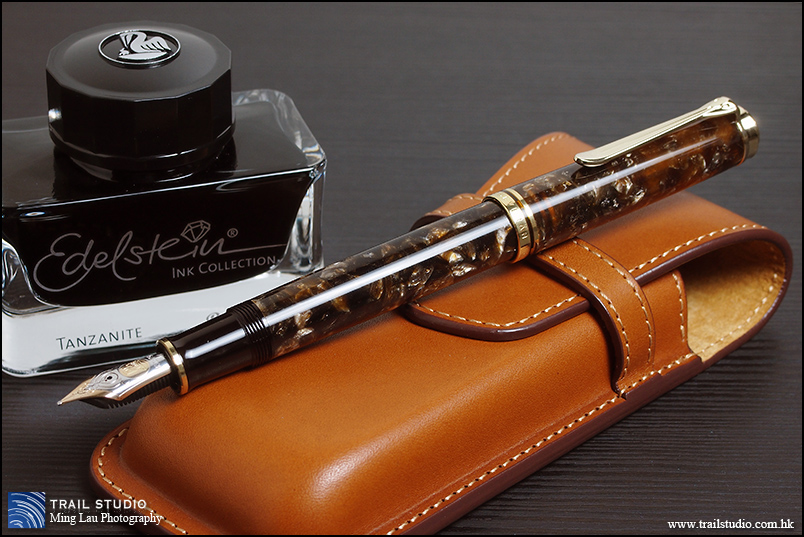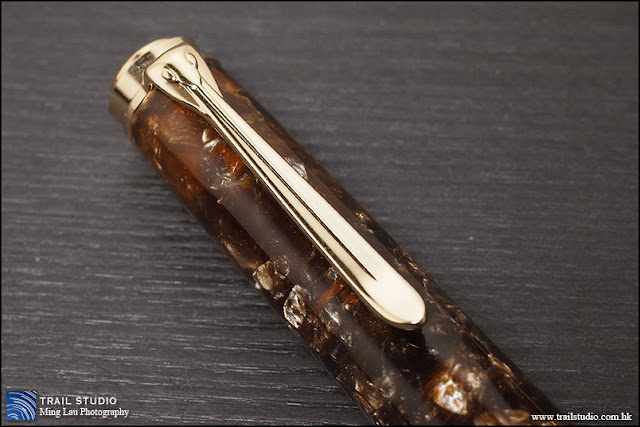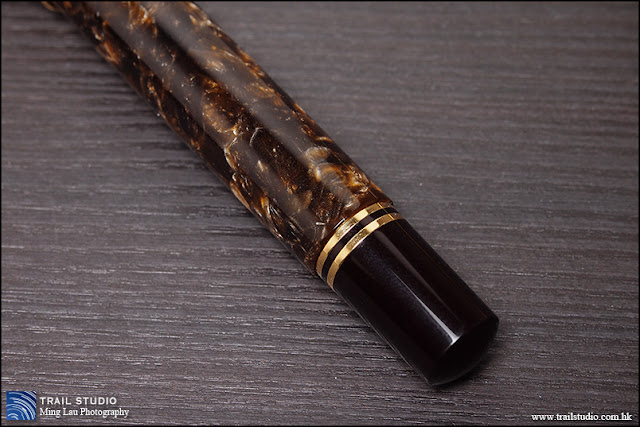
Pelikan Souveran M800 Renaissance Brown Special Edition Review

I always tell myself that I don’t need so many fountain pens, I always tell myself that some very cheap Chinese Fountain Pens actually write quite well especially after I fine-tune them to my liking, and I always tell myself that a piston-filler pen is just a springe with a nib attached. I even always tell myself that while I like big fat pens, the M800 is too fat for my small hands.But it turned out that when Pelikan announced the release of this M800 Special Edition, I was attracted by the promotional-photo and immediately pre-ordered it.
There’re many reasons for people to love a Pelikan, but I got my own special reason for not being able to deny this pen: The guys from Pelikan set the pen on a high-quality, classic picture frame and shot the promotional-photo! We’re in the professional Photo Printing & Framing business, that photo drew my attention to this particular pen – it looks like this is THE PEN for picture framer, the theme of this pen matches our business very well.
Moreover, we do a lot of our art/photo printing jobs on Germen papers with customers’ great satisfactions. It’s natural to love German pens when we love German papers. “German-engineering”, what else?
For those who are new to the fountain pen world, here is some of my brief knowledge about Pelikan, Pelikan is the family symbol of one of the early owners, and the firm started as ink manufacturer and later switched to the production of fountain pen with a patented differential piston-filler mechanism. Like many other pen manufacturers, Pelikan underwent up and down throughout the history, and the ownership was transferred several times, but nowadays it still be able to maintain its reputation as one of the best German-quality pen manufacturers.
I think one of the formula of success of Pelikan is the periodically release of a special edition pen, and the special editions are usually based on the familiar existing models with the change of body material or colour schemes, so they don’t need to completely redesign a pen or incorporate new tooling, additional cost (and selling price) is kept low while the careful choice of the special edition materials are always stunning and impressive, and give significant differentiation to the standard product line and more importantly, maintain existing customers’ royalty, very clever. This M800 Renaissance brown is one of those.

Packing
So here we go into the actual pen, though it’s a special edition, there’s nothing special with the packing, which is exactly the same as the standard Souveran line. The pen is protected inside a white “pen porch”, but this is just part of the packing and nothing more than a good looking bubble-wrap replacement, the elastic band is cumbersome and won’t last long if it’s really used as a pen porch.


Body/Design
The basic shape of this special edition is the same as the standard M800, just that the standard black cap and the strapped celloid barrel are changed into the stunning brown acrylic. Some people argued that the beauty of an acrylic material is nowhere comparable to celluloid, I think if one’s willing to invest, one may get elegant acrylics, such as what Pelikan demonstrated in its great-looking special edition pens. Some sources suggested that these types of materials are possibly produced by mixing celluloid flakes into acrylic, yet to confirm.
The M800 is the second largest pen in the Souveran line-up, many people suggested that it’s already too fat to grip comfortably and too back-heavy for a long writing session. I got the same feeling especially as my hands are small even for Asian’s standard. I like heavy pens, but back-heavy can be a problem even if the pen is not really heavy, interestingly, the balance with the cap unposted is already bad enough that posting it doesn’t create additional badness for me.
If you prefer a daily writer or a work-horse pen, perhaps stop at the M600.
As with all Souveran pens, the M800 has a golden ring at the tip of the section, it looks nice but I’m worried that the plated gold will flake off over time due to ink corrosion, it is a common problem for golden rings located that close to the nib.
To slow down ink corrosion process, Iron-gall inks should be avoided, clean and dry the pen thoroughly and don’t leave it inked when you don’t plan to use it for a long time, I know, it’s easier said than done specially if you’re an ink-holic.
Additional information about iron-gall inks, quite a lot of them are blue-black inks, they are at least slightly acidic and can corrode the metal parts of a pen faster than PH neutral ink (sadly I learnt it from experience but not from a book). If it’s that bad, why people like iron-gall inks? They are quite archival-safe and water resistant, together with the blue-black colour they can be the best ink for business purpose.




Filling Mechanism
Pelikan manufactured the first differential piston filler fountain pen, if a piston-filler is a must-have in your collection, the Pelikan is a must-buy. The black finial (it’s actually a very dark brown) is the piston knob, a quarter of anti-clockwise turn will trigger the brass piston mechanism. This brass piston is robust and should last for many years, it adds heft (some people including me translate a bit of heft into quality) to the M800 over its smaller siblings with plastic pistons, but it is a double-edged sword for people like me with small hands, the back-balance problem gives me some less than peasant feeling when writing.
It’s interesting to operate the piston, but the truth is, I dislike wiping a pen after dipping it into an ink bottle (and this pen is too fat for some bottles), I prefer syringe-fill my pens with no exception even for a Pelikan which is one of the best piston-fillers.
Am I wasting a piston-filler in this regard? May be not, the Pelikan’s nib-unit can be screwed out easily for a quick syringe-fill. With a C/C pen, I’ll have to remove the barrel, then remove the convertor before I can do a refill, which is more troublesome.The barrel is slightly translucent, it’s ok (not that clear actually) to hold the pen under strong back light to check the approximate ink level.

Nib
The pen comes with a standard M800 medium-grade 18K gold nib, with beautiful 2 –tone nib-work. It’s a hard nib but not to the extent of a nail, It’s easy to get a bit of line variation and ink shading with ease, there is a slightly stub-characteristic for this nib (which I like).
It seems to be well-known that Pelikan pens write a bit wider and wetter than many other pens of the same nib-grade, it is not the case here, I think the flow’s just average or even slightly on the dry side, for example it’s dryer than a Parker Duofold M and even a Pilot C74 F. I even compare it with a MB144 B as well, I know it’s unfair to compare M and B nibs, but the 144 is much wetter to an out-of-proportion extent. Forgot to mention, I inked it with 2 of my familiar J.herbin inks which are also in my other pens for fair comparison, I didn’t try it with Edlestein ink yet as I received mine just a week ago.
(Update: after some use, the nib performs just exactly like an average Pelikan nib, wet and smooth)

My conclusion
The Pelikan M800 may be a bit fat and back-heavy for some people to write comfortably, nevertheless it is an iconic fountain pen to be respected, and by throwing in a bit more money at the right timing, you’ll be able to avoid the standard, mass-produced M800 and get a special edition which is more unique and exciting due to the eye-catching material used. It’s not only a writing tool, but a jewel as well. If you ever come across a SE(or even a LE) and you know you want it badly, don’t wait as they will be sold out real fast.